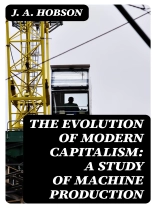In ‘The Evolution of Modern Capitalism: A Study of Machine Production, ‘ J. A. Hobson meticulously analyzes the transformative impact of machine production on the fabric of capitalism. Written in a period marked by rapid industrialization and burgeoning economic theories, Hobson employs a critical and analytical literary style that blends empirical observations with theoretical discourse. He articulates how technological advancements and mass production are not merely economic phenomena but also deeply intertwined with social structures, labor conditions, and political dynamics, thus placing his work within the larger context of social science and economic thought of the late 19th and early 20th centuries. J. A. Hobson, a prominent English economist and social critic, was heavily influenced by the industrial environment of his time, fostering his exploration of capitalism and its implications. His interdisciplinary background, combining elements of sociology, economics, and politics, informed his perspective on modern capitalism, leading him to engage with critiques of imperialism and social inequality. Hobson’s intellect and advocacy for social reform are palpable throughout his writings, revealing a commitment to understanding and addressing the complexities of his era. This insightful examination is highly recommended for scholars and students alike, providing a profound understanding of the historical and social dimensions of capitalism. Hobson’s work challenges readers to reconsider the ramifications of industrialization, making it essential for anyone interested in the evolution of economic systems and their societal impacts.
Mengenai Pengarang
J. A. Hobson (1858–1940) was a renowned English economist and social scientist, celebrated for his critiques of imperialism and economic theory. Hobson’s 1894 seminal work, ‘The Evolution of Modern Capitalism: A Study of Machine Production, ‘ is a key text that maps the transformations in the economic landscape brought on by the Industrial Revolution, offering a detailed analysis of how technological advancements and capital concentration affected the market structure and labour. His foresight in economic thought was not solely confined to this publication; Hobson’s theoretical perspectives reverberated through his extensive body of work, influencing Keynesian economics and later, development theory. A central figure among the radical liberals of his time, he approached economics with a holistic view. He addressed issues of inequality, poverty, and imperialism, arguing that unequal distribution of wealth led to overproduction and underconsumption. Hobson’s progressive stance on socio-economic issues, underpinned by his academic scholarship, has made him a reference point for both historical and contemporary economic discussions. In recognition of his contributions, he is often regarded as a pioneer of heterodox economics, and his works remain a subject of study for their originality, depth, and relevance.












